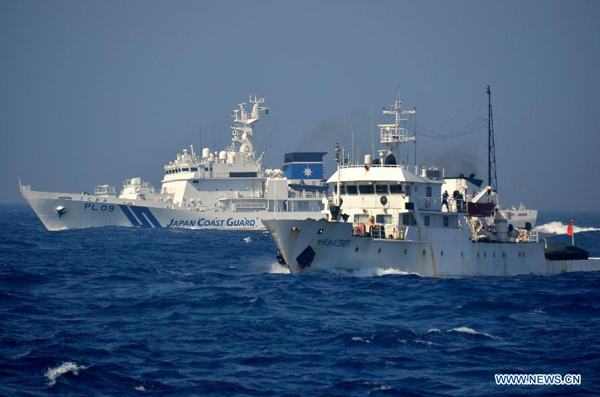'Buying-Islands' farce to damage China-Japan relations
 0 Comment(s)
0 Comment(s) Print
Print E-mail Xinhua, July 13, 2012
E-mail Xinhua, July 13, 2012
|
|
|
Chinese patrol ships encounter Japanese Coast Guard vessels near the Diaoyu Islands in the East China Sea, July 11, 2012. Three Chinese fishery patrol ships engaged in a verbal confrontation with Japanese Coast Guard ships during a routine patrol in waters near the Diaoyu Islands on Wednesday, fishery authorities said Thursday. [Xinhua/Luo Zhengguang] |
The Japanese side has staged a series of acts to "buy" China's Diaoyu Islands in recent weeks, but the country should be wary that its farcical ambitions may result in the situation spiralling out of control and seriously damaging China-Japan relations.
Against the backdrop of frequent shifts of leadership in recent years and a serious split within the Ruling Democratic Party on a tax hike bill, some Japanese politicians attempted to divert the attention from internal to external affairs by playing a leading role in the drama of "buying" the Diaoyu Islands.
The provocative move by the Japanese side seemingly helps Japan create some "evidence" for its "real control" over the Diaoyu Islands, but it will by no means change the fact that China has indisputable sovereignty over the islands.
On the contrary, Japanese provocations will only lead to escalating tensions with China, its major economic partner, and will harm bilateral ties and regional stability, and ultimately Japan's own interests.
For China's part, its commitment to the path of peaceful development doesn't mean blindly self-surrender, especially on issues that are related to crucial national interests.
China has always expressed its position on defending its territorial sovereignty over the Diaoyu Islands, and will never tolerate any of Japan's unilateral moves to infringe on Chinese territorial integrity.
Given the fact that Japan went ahead with its provocative plan to buy the Diaoyu Islands, anti-Japanese sentiments among Chinese netizens have run high over the recent months, which would obviously undermine the public will for stronger bilateral ties.
Besides, rising tensions have also aroused speculations among some Japanese media outlets about whether there would be conflicts between the two East Asian countries.
Such a scenario, although unlikely to materialize in the short term, does highlight the possibility of things getting out of control at some point.
Since the normalization of China-Japan diplomatic relations 40 years ago, relations between the two countries have witnessed great development. It is in the common interests of both countries and peoples to push for the healthy and stable progress of bilateral ties.
China has demonstrated enough patience and goodwill on the issue of the Diaoyu Islands. The Japanese side should rein in the brinkmanship activities of some radical politicians and work together with the Chinese side to defuse the tensions as soon as possible.
With the China-Japan relationship at stake, it is high time for the Japanese government to take swift actions to call the whole "buying-Islands" farce off before the hard-won friendship with China is damaged.






